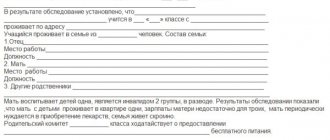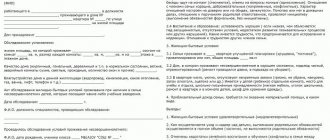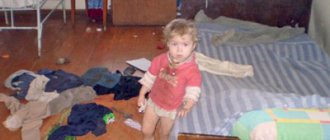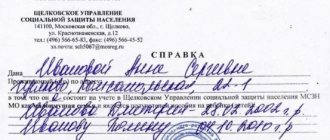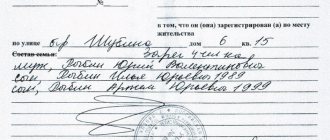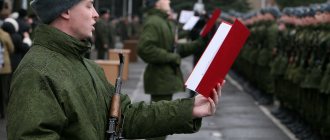In the field of protecting the rights of minor children, it is possible to inspect the place of his residence and draw up a report on the inspection of living conditions. Such a document is also drawn up when adopting a child, receiving a complaint to a government agency, law enforcement agencies, registering guardianship and trusteeship, etc. One of the responsibilities of the class teacher in educational institutions is to check the conditions in which his students grow and are educated. By the way, an inspection report on living conditions can also be drawn up in relation to the organization’s employees, if necessary.
In general, there are no official requirements for the content of acts. However, Order of the Ministry of Education of Russia dated January 10, 2019 N 4 established a special procedure and introduced the form of an act when conducting a survey of the living conditions of minors and their families
Download:
Act of inspection of the living conditions of a minor citizen and his family
An example of a housing inspection report
Living conditions inspection report
April 20, 2021 Zhukovsky, Moscow region
The commission consists of: teacher MBOU "Secondary School No. 125" Zhukovsky Anna Viktorovna Solarova, social teacher MBOU "Secondary School No. 125" Zhukovsky Lazarev Igor Aleksandrovich, member of the parent committee of grade 7 "B" Kolosov Petr Valerievich,
On April 20, 2021, I checked the living conditions of the student of grade 7 “B” of MBOU “Secondary School No. 125” in Zhukovsky, Bogdan Dmitrievich Shcherbinin.
Family composition: complete. Mother - Shcherbinina Anna Romanovna, father - Shcherbinin Dmitry Timurovich, younger sister - Shcherbinina Alisa Dmitrievna.
All family members live together in apartment No. 48 at the address: Moscow region, Zhukovsky, Lenina Ave., 205. The apartment with amenities is located on the 6th floor of a 12-story brick building, total area 56 sq. m. m.
Student Shcherbinin B.D. lives in a living room with an area of 25 sq. m., together with his younger sister (attends a preschool). Part of the room is allocated to separate sleeping areas. There are 2 separate workstations equipped with stationery and school supplies. There is a horizontal bar for sports and a shared play area. The child has the conditions for proper rest, sleep and study.
No violations of sanitary and hygienic standards were found during the inspection. The apartment is clean, warm, things are laid out neatly. All family members look neat.
Mother and father work at a permanent place of work, the family income is average. Children are provided with clothing, proper nutrition, and attend additional sections and clubs. Family relatives (grandparents) live separately. They visit them weekly.
The commission’s conclusion: no obvious signs of trouble were found when visiting the family. There are good friendly relations between family members. The child is provided with everything necessary according to his age.
Commission members
Solarova A.V.
Lazarev I.A.
Kolosov P.V.
Resolution of disputes
Unfortunately, the statistics are such that residents are not always satisfied with the work of the company entrusted with managing the house. And the management companies themselves do not always treat their responsibilities conscientiously.
The reasons for a dispute with managers may be different. For example, failure to provide services specified in the contract or failure to perform routine repairs.
In any case, if the management company does not fulfill its obligations, you need to start with peaceful negotiations and first of all contact its management and try to find out the reasons.
If such actions do not lead to anything, then you cannot do without contacting the relevant authorities. These include:
- Rospotrebnadzor;
- Housing Inspection;
- courts.
But in any case, you need to start your appeal with the management company itself. A written claim must be submitted to her, indicating and detailing all unfulfilled obligations or improperly provided services.
This step cannot be skipped, since it is the written response to this document that will serve as the basis for contacting higher supervisory institutions.
If there is no response to the submitted claim, it makes sense to contact Rospotrebnadzor and the Housing Inspectorate. These organizations are competent in resolving controversial issues related to the management of an apartment building.
If, in the process of resolving a controversial situation, more serious violations in the maintenance and operation of the house were discovered, then it is necessary to send a corresponding application to the prosecutor’s office or the judicial authorities to the management company, the sample of which does not have a strictly approved form.
The responsibilities of a management company for maintaining housing and managing the common property of the owners of an apartment building are quite a heavy burden. This work has many subtleties and nuances.
Apartment owners must clearly understand the entire process and procedure for organizing management. Only then will the management organization provide services in full and of proper quality.
Why is a housing inspection report drawn up?
The purpose of drawing up the document is to record living conditions and prepare a conclusion: whether the basic needs of the child are provided by the persons with whom he lives, or whether they are ready to accept the child (upon restoration of parental rights, etc.). Or whether the citizen needs to improve their living conditions, etc. If damage is caused to the apartment, it would be correct to draw up an Apartment Inspection Report.
An inspection report of housing conditions is necessary when considering claims for deprivation of parental rights, their restoration, determination of the child’s place of residence, adoption of a child, etc. The obligation to draw up such a document is assigned when registering a child in the children's room of the police, in cases where a minor is brought to administrative or criminal liability.
The composition of the commission depends on the purpose of drawing up the housing inspection report. These can be police officers (as a rule, local police officers), employees of guardianship and trusteeship authorities, school teachers, employees of the BTI, housing maintenance organization, etc. An inspection of living conditions can also be carried out based on a complaint from neighbors or a doctor’s request.
Form
This act, in its form, cannot be drawn up in a free form, but in modern legislation there is also no exact, stated example.
Such a document is drawn up on a special form approved by a certain authority authorized for inspection.
Why is a living conditions inspection report drawn up?
The inspection report of housing conditions is formed and drawn up exclusively by the guardianship authorities or other bodies authorized to inspect. It is usually drawn up to record in writing the violations found, or the absence thereof. Also, such an act is needed for those cases when people want to take guardianship over someone. Here you need to check the apartment, because without it such a procedure is impossible. Another situation for drawing up such an act is suspicions from neighbors, teachers at school, university, and so on that a child is being bullied.
Important! The act is drawn up after examining the child’s living conditions, since the document itself is the conclusion to the entire inspection.
When to check
Living conditions inspections are carried out in many different cases. All of them are related to the actions, behavior or moral and physical state of the child in public.
Contents of the housing inspection report
The housing inspection report is drawn up in free form, and its structure is determined by the purpose. The general requirement for such documents (in order to have the force of evidence in a civil case or have legal significance) is:
- Availability of a date for conducting a housing inspection. It may coincide with the date of drawing up the act, or it may differ (the act must be drawn up no later than 3 days after visiting the property)
- Name of the document (act), date and place of its publication
- Members of the commission and the purpose of the inspection (we are checking the student, in connection with a complaint from neighbors, etc.)
- Object of study (address) and characteristics of housing (house, apartment, area, how many rooms, who owns it, in which house it is located, amenities, etc.)
- Who lives in the apartment - family composition, other relatives or other persons living together, sometimes their place of work and income, behavior, appearance
- Availability of pets, cleanliness, arrangement, etc.
The document may contain conclusions and conclusions about the compliance of housing and sanitary conditions with standards. The act of examining housing conditions is signed only by members of the commission, but the persons whose living conditions were checked and their legal representatives have the right to familiarize themselves with the document.
Form
Such checks are carried out by special commissions. All details, including conclusions, are recorded using the appropriate act. To compile it there is no need to use a unified form. The document is drawn up in a free style. But, despite this, detailed information must be present not only about the home being inspected, but also about family members.
What types of living conditions are there?
In different families, the living conditions of children can vary significantly. They are not always positive. Representatives of the commission need to identify the reasons why people live in poor housing conditions. There are three main types of living conditions:
- Unsatisfactory . As a rule, this type involves gross violations of hygiene and sanitary standards. For example, this may be excessive dampness, the appearance of fungus and mold, poor lighting, or water undrinkable. This is also the poor technical condition of the home, for example, parasites in the apartment, fallen plaster, leaking roof, wobbly walls.
- Satisfactory . Electricity, water supply, gas supply and other communications are present. But at the same time, the family may still need some help. For example, if a family has 3-5 people, but lives in a one-room apartment. Accordingly, these residents need to expand their living space.
- Comfortable . Essentially, this category includes conditions that are above average. In addition to the basic ones, the family also has additional conditions. For example, a large home is located near shops, schools, and medical institutions. The house has security and a concierge. The home is located in an area with developed infrastructure.
As you might guess, depending on the type of conditions, a decision is made to register as a family in need of social assistance. Some may have thoughts about deliberately worsening their living conditions in order to receive help from the state. However, this is pointless. You need to know that if such fraud is discovered, the family will face serious punishment.
The procedure for conducting an examination by the guardianship authority according to Order of the Ministry of Education of Russia dated January 10, 2019 N 4
The examination is carried out in order to identify circumstances indicating a lack of parental care over a minor citizen, and to take measures to protect the rights and interests of children in cases of death of parents, deprivation of their parental rights, restrictions on their parental rights, recognition of parents as incompetent, illness of parents, long-term absence parents, evasion of parents from raising children or from protecting their rights and interests, including the refusal of parents to take their children from educational organizations, medical organizations, organizations providing social services, or similar organizations, when the actions or inaction of parents create conditions that constitute threat to the life or health of children or interfering with their normal upbringing and development, as well as in other cases of lack of parental care.
The examination is carried out by the guardianship and trusteeship authority or by an educational organization, a medical organization, an organization providing social services, or another organization, including an organization for orphans and children left without parental care, which, in accordance with the Rules for the exercise of certain powers of the guardianship and guardianship authorities guardianship of minor citizens by educational organizations, medical organizations, organizations providing social services, or other organizations, including organizations for orphans and children left without parental care, approved by Decree of the Government of the Russian Federation of May 18, 2009 N 423 , the authority of the guardianship and trusteeship body has been transferred to identify minor citizens in need of establishing guardianship or trusteeship over them, including examining the living conditions of such minor citizens and their families.
The basis for the examination is oral and written requests from legal entities and individuals containing information about children received by the guardianship and trusteeship authority or organization at the actual location of the children.
The examination is carried out by an authorized specialist (specialists) of the guardianship and trusteeship body or organization within three days from the date of receipt of the information.
Checking conditions after adoption or guardianship
Having entered into a guardianship agreement or adopted a child, you should not think that the PA will not check the living conditions - this is not the case.
During guardianship, government agency employees visit guardians with the following frequency:
- 1 time during the first month after the decision to appoint a citizen as a guardian is made;
- Every 3 months for the first year thereafter;
- Every six months for the second year.
The deadlines are regulated by Decree of the Government of the Russian Federation dated May 18, 2009 No. 423.
Adoptive parents are checked less frequently:
- For the first time, the examination is carried out after 5 months from the date of entry into force of the decision on adoption;
- The second - in the period from 11 to 13 months from the specified date;
- Third - from 23 to 25 months;
- Fourth - within 35-37 months.
The deadlines are established by Decree of the Government of the Russian Federation of March 29, 2000 No. 275.
Inspection report after establishing guardianship
Based on the results of each inspection, housing inspection reports are drawn up, which reflect complete information about the child’s living conditions.
Information reflected in the act:
- Ensuring the safety of the ward’s property, the guardian’s compliance with his rights and interests;
- Education, maintenance, raising a child (characteristics);
- Detected violations, deadlines for elimination;
- Recommendations to the representative on improving the living conditions of the ward.
If violations are identified, the document indicates a proposal to hold the citizen accountable for failure to fulfill or improper performance of guardianship duties. The decision on this issue is made by the head of the POiP.
What is revealed during the examination?
During the examination, the following is revealed:
1. Level of provision of the child’s basic needs:
- Health status: general visual assessment of the level of physical development and its correspondence to the child’s age, the presence of diseases, special needs for medical care, drug provision; presence of signs of physical and (or) mental abuse of the child; an explanation from parents and/or persons living with the child about signs of violence in the child; presence of cases of child abuse in the past.
- Appearance: compliance with the child’s personal hygiene standards, availability, quality and condition of clothing and shoes, their compliance with the season, as well as the age and gender of the child, etc.
- Basic care: meeting the child’s basic needs - food, shelter, hygiene, clothing, medical care; the child’s daily routine, sleep patterns, their correspondence to age and individual characteristics.
- Social adaptation: the presence of communication skills with others, self-care skills in accordance with the age and individual characteristics of the child’s development, the adequacy of the child’s behavior in different environments, etc.
- Upbringing and education: name of the organization(s) carrying out educational activities, including institutions of additional education for children, which the child attends, the form and success of mastering educational programs in accordance with the age and individual characteristics of the child’s development ; organizing the child’s free time and recreation; the presence of a developmental and learning environment.
- Satisfying the child's emotional needs.
2. Family environment of the child:
- Family composition, who actually cares for and supervises the child; the presence and place of residence of close relatives of the child, the degree of participation of parents and other persons living together, relatives in the upbringing and maintenance of the child; the degree of attachment and relationship of the child with parents and family members.
- The relationships between family members, their nature; features of relationships between family members, the impact of these relationships on the child, changes in family composition in the present and past, distribution of responsibilities in the family.
3. Housing, living and property conditions:
- Living conditions in which the child lives: the presence and ownership of living quarters, its total and living area, number of rooms, landscaping and sanitary and hygienic condition; the child has a separate equipped place (room, corner) for sleep, games, activities; availability of personal belongings (toys, books, etc.) in accordance with the child’s age, etc.
- Ensuring the safety of the child in accordance with his age (lack of access to dangerous household items, medicines, electrical appliances, gas, etc., risk of harm to the child both at home and outside the home).
- Family income structure: main sources of income (income of parents and other family members, alimony, pensions, benefits, other social benefits); average monthly and per capita family income; information about the property and property rights of the child; information about ensuring the basic needs of the child.
4. The presence of circumstances that pose a threat to the life and health of the child, his physical and moral development, or violate his rights and interests protected by law; facts of neglect, cruel, rude, degrading treatment, insult or exploitation of a child, physical or mental violence against a child, an attempt on his sexual integrity.
During the survey, such forms of obtaining information are used as a conversation with the child, his parents and other family members, a survey of people who have data on the relationship between the parents and the child, their behavior in everyday life, observation, study of documents, educational and creative works of the child, and others.
During the survey, the confidentiality of citizens' personal data is ensured.
Programs to improve housing quality
In 2021, the plan for the national project “Housing” has completely changed. Now the ZHBU act is actually required for participation in only 2 programs (Resolution of the Government of the Russian Federation of December 30, 2017 N 1710):
- "Young family". Citizens under 35 years of age, married, and recognized as needing housing can receive a government surcharge for obtaining a mortgage, constructing or purchasing an apartment or residential building;
- "Mortgage and rental housing." Low-income residents of damaged apartment buildings and those subject to demolition who do not participate in other resettlement programs can count on assistance in purchasing premises.
It is important to know!
Those in need can count on government assistance when renting social apartments. Regional authorities support their residents with discounts on housing and communal services and other benefits.
Registration of results
Based on the results of the survey, a report on the living conditions of the minor citizen and his family is drawn up, containing:
- assessment of the circumstances identified during the survey;
- conclusions about the presence of conditions that pose a threat to the life or health of the child or impede his normal upbringing and development;
- conclusions about the presence of circumstances indicating a lack of parental care over the child; recommendations on the form of protection of the rights and legitimate interests of the child.
The survey report is drawn up within 3 days from the date of the survey, signed by the authorized specialist of the guardianship and trusteeship body or organization who conducted the survey, and approved by the head of the guardianship and trusteeship body or organization.
The inspection report carried out by the organization is drawn up in two copies, one of which is sent to the relevant guardianship and trusteeship authority within 1 day following the day of its approval, the second is stored in the organization.
A copy of the examination report, certified by an authorized official of the guardianship and trusteeship body of a constituent entity of the Russian Federation or a local government body (if by law of a constituent entity of the Russian Federation, local government bodies are vested with powers of guardianship and trusteeship in accordance with federal laws) or the head of the organization that conducted the examination, is sent to the parents ( legal representatives) of the child within 3 days from the date of approval of the examination report if there is information about the place of residence or place of stay of the parents (legal representatives) of the child.
If, based on the results of the examination, circumstances are revealed that indicate the absence of parental care of the child, the organization is obliged, within 1 day following the day of the examination, to report this to the guardianship and trusteeship authority at the place of the child’s actual location.
Rules
During an inspection, the commission or an authorized specialist draws up an inspection report.
Inspectors receive information about living conditions not only during a visual inspection of the residential premises, but also:
- from conversations with family members and minors;
- survey of neighbors, HOA officials, responsible residents;
- studying documents, for example, receipts for payment of housing and communal services;
- familiarization with school work, notebooks, diaries, the results of his creativity, hobbies, etc.
Based on the collected data, an act is formed. The family in respect of whom the examination was carried out has the right to familiarize itself with it.
The commission’s conclusion can be challenged within 10 days in the organization that ordered or conducted the inspection.
Receipt structure
There is no approved form of receipt, but there is an approximate form. The receipt is generated by the management organization. It contains a list of utilities and housing services, indicating what is included in other services, if any.
The receipt for payment of utilities consists of several sections:
- Information about the payer and contractor.
- Calculation of fees for housing, utilities and other services.
- Reference data - this includes the readings of general metering devices and the total volume of consumption of the heating system in an apartment building.
Tariffs, volume of consumption and prices for each type of resource are also written on the receipt. If there is data on debt, overpayment and recalculation, they are also indicated.
The consumer is obliged to pay the bill before the tenth day of the month following the billing period. And the contractor must send the receipt by the first day of the month following the expired billing period.
Receipt for payment of housing, utilities and other services in an apartment building from the management company
